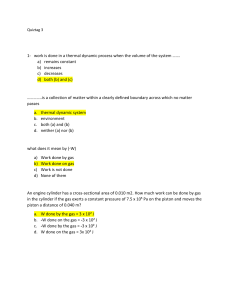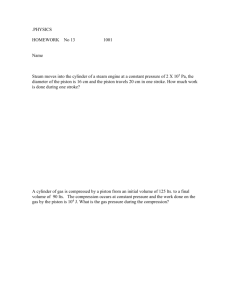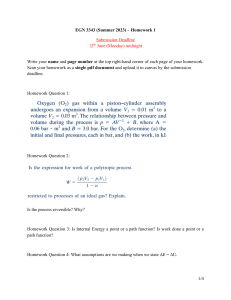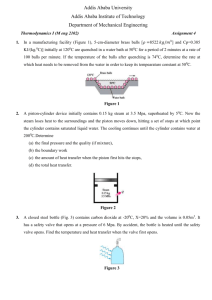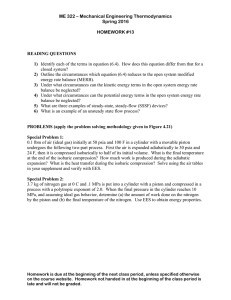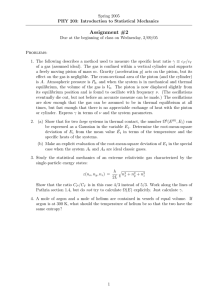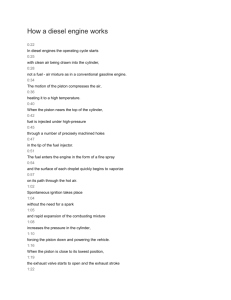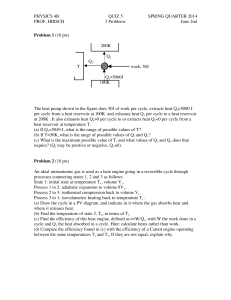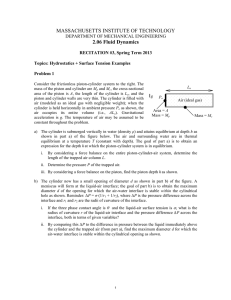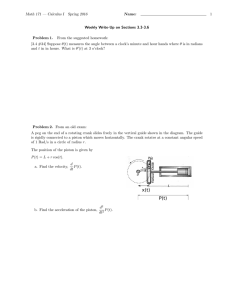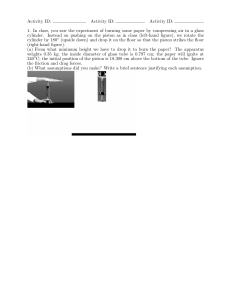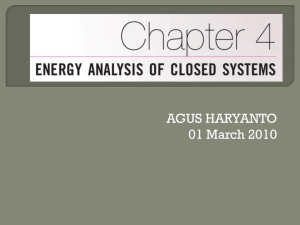File
advertisement
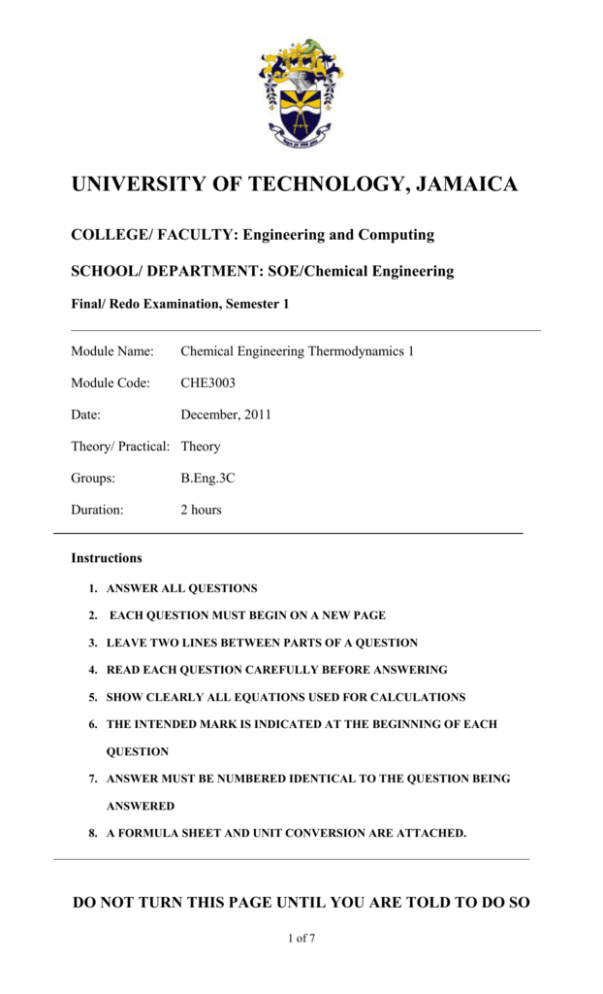
UNIVERSITY OF TECHNOLOGY, JAMAICA COLLEGE/ FACULTY: Engineering and Computing SCHOOL/ DEPARTMENT: SOE/Chemical Engineering Final/ Redo Examination, Semester 1 Module Name: Chemical Engineering Thermodynamics 1 Module Code: CHE3003 Date: December, 2011 Theory/ Practical: Theory Groups: B.Eng.3C Duration: 2 hours Instructions 1. ANSWER ALL QUESTIONS 2. EACH QUESTION MUST BEGIN ON A NEW PAGE 3. LEAVE TWO LINES BETWEEN PARTS OF A QUESTION 4. READ EACH QUESTION CAREFULLY BEFORE ANSWERING 5. SHOW CLEARLY ALL EQUATIONS USED FOR CALCULATIONS 6. THE INTENDED MARK IS INDICATED AT THE BEGINNING OF EACH QUESTION 7. ANSWER MUST BE NUMBERED IDENTICAL TO THE QUESTION BEING ANSWERED 8. A FORMULA SHEET AND UNIT CONVERSION ARE ATTACHED. DO NOT TURN THIS PAGE UNTIL YOU ARE TOLD TO DO SO 1 of 7 QUESTION 1 (30 Marks) A piston–cylinder device initially contains 0.15 kg steam at 3.5 MPa, superheated by 5°C. Now the steam loses heat to the surroundings and the piston moves down, hitting a set of stops at which point the cylinder contains saturated liquid water. The cooling continues until the cylinder contains water at 200°C. Determine: a.) the final pressure and the quality (if mixture). [14] b.) the boundary work. [6] c.) the amount of heat transfer when the piston first hits the stops. [5] d.) and the total heat transfer. [5] QUESTION 2 (20 marks) a.) Consider two Carnot heat engines operating in series. The first engine receives heat from the reservoir at 1800 K and rejects the waste heat to another reservoir at temperature T. The second engine receives this energy rejected by the first one, converts some of it to work, and rejects the rest to a reservoir at 300 K. If the thermal efficiencies of both engines are the same, determine the temperature T. [8] b.) A 25-kg iron block initially at 350°C is quenched in an insulated tank that contains 100 kg of water at 18°C. Assuming the water that vaporizes during the process condenses back in the tank, determine the total entropy change during this process. The specific heat of water at 25°C is cp = 4.18 kJ/kg.°C. The specific heat of iron at room temperature is cp = 0.45 kJ/kg.°C [12] QUESTION 3 (25 marks) Using the virial equations of state, calculate the volume occupied by 23.2 g of n-butane at 258.3oC and 30.0 bar. 2 of 7 QUESTION 4 (25marks) Consider a cylinder fitted with a piston that contains 2.0 mol of H2O in a container at 1000 K. Calculate how much work is required to isothermally and reversibly compress this gas from 10.0 L to1.0 L in each of the following cases: a.) Using the ideal gas model for water. [5] b.) Using the Redlich-Kwong equation to relate P, v, and T. where a = 14.24 JK1/2m3/mol2 and b = 2.11x10-5 m3/mol [5] c.) Using steam tables [15] TOTAL MARKS =100 END OF PAPER 3 of 7 Formula Sheet 2 𝑃= 𝑊𝑏 = − ∫ 𝑃𝑑𝑉 1 0.42748𝑅 2 𝑇𝑐 2.5 𝑎= 𝑃𝑐 𝑊𝑏 = −𝑃(𝑉2 − 𝑉1 ) 𝑊𝑏 = −𝑃1 𝑉1 ln 𝑊𝑏 = − 𝑅𝑇 𝑎 − 𝑣̂ − 𝑏 √𝑇[𝑣̂(𝑣̂ + 𝑏)] 𝑉2 𝑉2 = −𝑚𝑅𝑇 ln 𝑉1 𝑉1 𝑏= (𝑃2 𝑉2 − 𝑃1 𝑉1 ) 𝑚𝑅(𝑇2 − 𝑇1 ) =− 𝑛−1 𝑛−1 ∆𝐻 1.092(𝑙𝑛𝑃𝑐 − 1.013) = 𝑅𝑇𝑛 0.930 − 𝑇𝑟𝑛 𝑦 = 𝑦𝑓 + 𝑥(𝑦𝑔 − 𝑦𝑓 ) Where, Pc is the critical pressure in bars and Trn is the reduced temperature at Tn 𝑄 + 𝑊 = ∆𝑈 + ∆𝐸𝑘 + ∆𝐸𝑝 𝜂= 𝑊 𝑄𝐻 − 𝑄𝐶 𝑄𝐶 = =1− 𝑄𝐻 𝑄𝐻 𝑄𝐻 𝜂= 𝑇𝐻 − 𝑇𝐶 𝑇𝐶 =1− 𝑇𝐻 𝑇𝐻 0.08662𝑅𝑇𝑐 𝑃𝑐 0.38 ∆𝐻2 (1 − 𝑇𝑟2 ) = ∆𝐻1 (1 − 𝑇𝑟1 𝐵 (0) = 0.083 − 𝑃𝑉 = 𝑧𝑛𝑅𝑢 𝑇 𝐵 (1) = 0.139 − 𝑄 = 𝑚𝐶𝑝 ∆𝑇 𝑑𝑄𝑟𝑒𝑣 𝑇 𝑍 = 1+ 𝑇 𝑃 ∆𝑆 = 𝑚 [𝐶𝑝 ln 𝑇2 − 𝑅 ln 𝑃2 ] 1 𝑇𝑟 1.6 0.172 𝑇𝑟 4.2 𝐵𝑟 = 𝐵 (0) + 𝑤𝐵 (1) 𝑄𝑟𝑒𝑣𝑒𝑟𝑠𝑖𝑏𝑙𝑒 = 𝑇∆𝑆 ∆𝑆 = ∫ 0.422 1 4 of 7 𝐵𝑟 𝑃𝑟 𝑇𝑟 5 of 7 6 of 7 7 of 7
